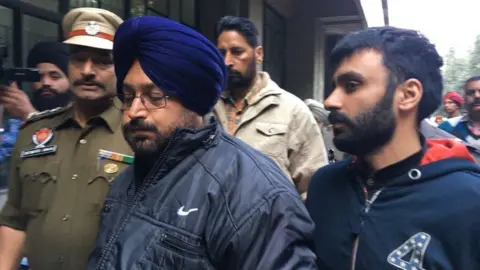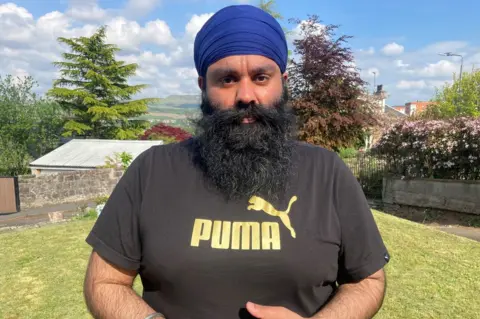Rishi Sunak urged to raise India detention of British man
 BBC
BBCA cross-party group of MPs are calling on Rishi Sunak to intervene in the case of a British man who is facing the death penalty in India.
More than 70 MPs signed a letter urging the PM to call on Narendra Modi to "immediately release" campaigner Jagtar Singh Johal, when he travels to Delhi for the G20 leaders' summit.
They say Mr Johal has been "arbitrarily detained" for over five years.
The PM's spokesperson would not confirm or deny if the case would be raised.
Mr Johal, who is now 36, comes from Dumbarton in Scotland. He was a blogger and campaigner for Sikh human rights, which are said to have brought him to the attention of the Indian authorities.
He travelled to India in October 2017 to get married. The campaign group Reprieve says that while he was out shopping with his wife, he was hooded, bundled into a car by men in plainclothes, "severely tortured", and made to sign blank pieces of paper.
Tory MP David Davis told the BBC that "the first duty of a state should be to prevent a citizen getting harmed", and that if a citizen had been harmed and subjected to injustice, "the government should be raising the most serious protests".
He added: "That does not seem to be happening at the moment and that is a failure of the Foreign Office to do its most fundamental duty."
In their letter, the MPs say that "upon his arrest, Jagtar's interrogators electrocuted him, and threatened to douse him in petrol and set him alight. To make the torture stop, Jagtar recorded video statements and signed blank pieces of paper."
The UN Working Group on Arbitrary Detention said he had been targeted "because of his activism writing public posts calling for accountability for alleged actions committed against Sikhs by the authorities".
The MPs' letter says the UN Working Group "concluded that Jagtar's continued detention...lacks any legal basis".
Almost six years on, Mr Johal remains in prison in India. He faces eight charges of conspiracy to murder, linked to political violence in India. His family say court proceedings have started but been adjourned repeatedly.
His brother Gurpreet Singh Johal, who is a lawyer and Labour councillor in Dumbarton, told the BBC: "The fear for the family is that false allegations have become false charges, which could become a false conviction and result in the death penalty."
He said both former prime ministers Boris Johnson and Theresa May had discussed the case with India's prime minister, and said "it would be very difficult for Rishi Sunak not to raise the case... if Rishi Sunak doesn't, the question will be 'why didn't you?'.

"Given Rishi Sunak has a good relationship with the Indian prime minister it shouldn't be a hard ask. Almost six years have elapsed, no evidence has been produced against Jagtar. These are just charges alleged against him, and it should be innocent until proven guilty."
He added: "It should be very easy to call for Jagtar's release. The UK did it, rightfully so for Nazanin [Zagari-Ratcliffe] and Anousheh [Ashouri] in Iran previously."
Asked if Mr Sunak would raise the case, the prime minister's official spokesperson said: "I am not going to pre-empt what they will or won't discuss."
In response to further questions, the spokesman said the government had raised concerns relating to Jagtar with the Indian government "on more than 100 occasions".
He said they included consular access, judicial process and reports of torture.
He said the family was receiving consular assistance and that Foreign Office Minister Lord Ahmad had met them recently.
However, in a letter sent to Gurpreet Singh Johal in July and seen by the BBC, Foreign Secretary James Cleverly said he had decided it was best not to press India over the issue.
Mr Cleverly wrote: "I do not consider that calling for Jagtar's release would result in the Indian authorities releasing him. Indeed I fear this could impact the co-operation we depend on... to conduct consular visits, resolve welfare concerns and attend court hearings."
That has angered both Mr Davis and Mr Johal's family. Gurpreet Singh Johal said: "It's saying basically 'I'm not going to do it and I'd rather have him rot in jail', that's the impression I get."
Mr Davis said it set "a terrible precedent" and "it encourages more governments to be prickly about complaints".
Gurpreet Singh Johal said he believed the UK's reluctance to speak up about the case now was connected to Mr Sunak's desire to sign a trade deal with India.
"Their focus appears to be that India are an up-and-coming country and they want this trade deal signed off with them, and they are putting trade over human rights," he said.
Mr Davis said he was clear a trade deal should come second to legal rights of a British citizen.
He added: "You don't have to be Palmerston to understand that the rights of a British citizen are the paramount concern of a British government and we do not accept torture as the price of a trade deal. Full stop."
